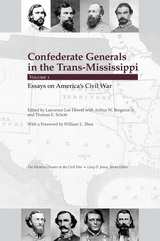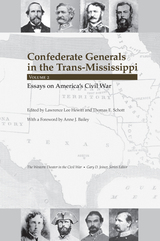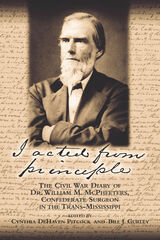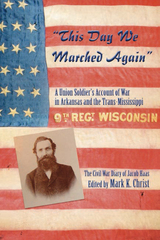5 books about Trans - Mississippi

Confederate Generals in the Trans-Mississippi, Vol 1
Essays on America's Civil War
Lawrence L. Hewitt, Arthur W. Bergeron, and Thomas E. Schott
University of Tennessee Press, 2013
Until relatively recently, conventional wisdom held that the Trans-Mississippi Theater was a backwater of the American Civil War. Scholarship in recent decades has corrected this oversight, and a growing number of historians agree that the events west of the Mississippi River proved integral to the outcome of the war. Nevertheless, generals in the Trans-Mississippi have received little attention compared to their eastern counterparts, and many remain mere footnotes to Civil War history. This welcome volume features cutting-edge analyses of eight Southern generals in this most neglected theater—Thomas Hindman, Theophilus Holmes, Edmund Kirby Smith, Mosby Monroe Parsons, John Marmaduke, Thomas James Churchill, Thomas Green, and Joseph Orville Shelby—providing an enlightening new perspective on the Confederate high command.
Although the Trans-Mississippi has long been considered a dumping ground for failed generals from other regions, the essays presented here demolish that myth, showing instead that, with a few notable exceptions, Confederate commanders west of the Mississippi were homegrown, not imported, and compared well with their more celebrated peers elsewhere. With its virtually nonexistent infrastructure, wildly unpredictable weather, and few opportunities for scavenging, the Trans-Mississippi proved a challenge for commanders on both sides of the conflict. As the contributors to this volume demonstrate, only the most creative minds could operate successfully in such an unforgiving environment.
While some of these generals have been the subjects of larger studies, others, including Generals Holmes, Parsons, and Churchill, receive their first serious scholarly attention in these pages. Clearly demonstrating the independence of the Trans-Mississippi and the nuances of the military struggle there, while placing both the generals and the theater in the wider scope of the war, these eight essays offer valuable new insight into Confederate military leadership and the ever-vexing questions of how and why the South lost this most defining of American conflicts.
Although the Trans-Mississippi has long been considered a dumping ground for failed generals from other regions, the essays presented here demolish that myth, showing instead that, with a few notable exceptions, Confederate commanders west of the Mississippi were homegrown, not imported, and compared well with their more celebrated peers elsewhere. With its virtually nonexistent infrastructure, wildly unpredictable weather, and few opportunities for scavenging, the Trans-Mississippi proved a challenge for commanders on both sides of the conflict. As the contributors to this volume demonstrate, only the most creative minds could operate successfully in such an unforgiving environment.
While some of these generals have been the subjects of larger studies, others, including Generals Holmes, Parsons, and Churchill, receive their first serious scholarly attention in these pages. Clearly demonstrating the independence of the Trans-Mississippi and the nuances of the military struggle there, while placing both the generals and the theater in the wider scope of the war, these eight essays offer valuable new insight into Confederate military leadership and the ever-vexing questions of how and why the South lost this most defining of American conflicts.
[more]

Confederate Generals in the Trans-Mississippi, vol. 2
Lawrence Lee Hewitt
University of Tennessee Press, 2015
In contrast to Robert E. Lee’s Army of Northern Virginia, the armies and events of the Civil War’s Trans-Mississippi Theater have received scant historical attention, to the detriment of our understanding not only of individuals and events west of the Mississippi River, but also to the east of it. In Confederate Generals in the Trans-Mississippi, Volume 2, noted Civil War historians offer fresh scholarship on eight generals who made names for themselves in the region, providing intriguing insight into important wartime issues in the Trans-Mississippi and beyond.
Contrary to popular belief, the Trans-Mississippi did not serve as a dumping ground for generals who had failed in Virginia. Instead, the majority of generals who served in the region were homegrown and faced challenges unknown to their counterparts in the East—expansive territory, few men, and limited transportation for the meager supplies available. Superior Union numbers in the West, however, did not guarantee Union victory. As these essays show, southern generals often beat themselves because of personal failings or an inability to work together. Sterling Price and Ben McCulloch refused to cooperate, Henry Sibley combined alcoholism with cowardice, and the able French-born Prince de Polignac faced language barriers. The war ended before Joseph Brent, a visionary regarding tank warfare, could make his name as a brigadier, and “Prince John” Magruder’s achievements in Texas remain overshadowed by his earlier career in Virginia. The Cajun Alfred Mouton, a superior leader, died on a battlefield in his native Louisiana, while Mosby Parsons survived the war only to be murdered by Mexican cavalry. While some of these generals breathed life into the Confederacy, others hastened its downfall.
By chronicling the lives and careers of these eight generals, this welcome volume integrates the Trans-Mississippi more fully with the Western Theater and illuminates critical issues vital to understanding the South’s ultimate defeat.
Contrary to popular belief, the Trans-Mississippi did not serve as a dumping ground for generals who had failed in Virginia. Instead, the majority of generals who served in the region were homegrown and faced challenges unknown to their counterparts in the East—expansive territory, few men, and limited transportation for the meager supplies available. Superior Union numbers in the West, however, did not guarantee Union victory. As these essays show, southern generals often beat themselves because of personal failings or an inability to work together. Sterling Price and Ben McCulloch refused to cooperate, Henry Sibley combined alcoholism with cowardice, and the able French-born Prince de Polignac faced language barriers. The war ended before Joseph Brent, a visionary regarding tank warfare, could make his name as a brigadier, and “Prince John” Magruder’s achievements in Texas remain overshadowed by his earlier career in Virginia. The Cajun Alfred Mouton, a superior leader, died on a battlefield in his native Louisiana, while Mosby Parsons survived the war only to be murdered by Mexican cavalry. While some of these generals breathed life into the Confederacy, others hastened its downfall.
By chronicling the lives and careers of these eight generals, this welcome volume integrates the Trans-Mississippi more fully with the Western Theater and illuminates critical issues vital to understanding the South’s ultimate defeat.
Lawrence Lee Hewitt is professor of history emeritus at Southeastern Louisiana University. He is the author of Port Hudson: Confederate Bastion on the Mississippi and coeditor of six anthologies dealing with America’s Civil War.
Thomas E. Schott worked as a historian for the Department of Defense. He is the author of Alexander H. Stephens of Georgia: A Biography, winner of the Jefferson Davis Award, and coeditor with Lawrence Hewitt of Lee and His Generals: Essays in Honor of T. Harry Williams.
Thomas E. Schott worked as a historian for the Department of Defense. He is the author of Alexander H. Stephens of Georgia: A Biography, winner of the Jefferson Davis Award, and coeditor with Lawrence Hewitt of Lee and His Generals: Essays in Honor of T. Harry Williams.
[more]

I Acted from Principle
The Civil War Diary of Dr. William M. McPheeters, Confederate Surgeon in the Trans-Mississippi
Cynthia DeHaven Pitcock
University of Arkansas Press, 2000
At the start of the Civil War, Dr. William McPheeters was a distinguished physician in St. Louis, conducting unprecedented public-health research, forging new medical standards, and organizing the state's first professional associations. But Missouri was a volatile border state. Under martial law, Union authorities kept close watch on known Confederate sympathizers. McPheeters was followed, arrested, threatened, and finally, in 1862, given an ultimatum: sign an oath of allegiance to the Union or go to federal prison. McPheeters "acted from principle" instead, fleeing by night to Confederate territory. He served as a surgeon under Gen. Sterling Price and his Missouri forces west of the Mississippi River, treating soldiers' diseases, malnutrition, and terrible battle wounds. From almost the moment of his departure, the doctor kept a diary. It was a pocket-size notebook which he made by folding sheets of pale blue writing paper in half and in which he wrote in miniature with his steel pen. It is the first known daily account by a Confederate medical officer in the Trans-Mississippi Department. It also tells his wife's story, which included harassment by Federal military officials, imprisonment in St. Louis, and banishment from Missouri with the couple's two small children. The journal appears here in its complete and original form, exactly as the doctor first wrote it, with the addition of the editors' full annotation and vivid introductions to each section.
[more]

"This Day We Marched Again"
A Union Soldier's Account of War in Arkansas and the Trans-Mississippi
Mark K. Christ
Butler Center for Arkansas Studies, 2014
A testament to the valor and determination of a common soldier On September 17, 1861, twenty-two-year-old Jacob Haas enlisted in the Sheboygan Tigers, a company of German immigrants that became Company A of the Ninth Wisconsin Infantry Regiment. Over the next three years, Haas and his comrades marched thousands of miles and saw service in Arkansas, Kansas, Missouri, and the Indian Territory, including pitched battles at Newtonia, Missouri, and Jenkins’ Ferry, Arkansas. Haas describes the war from the perspective of a private soldier and an immigrant as he marches through scorching summers and brutally cold winters to fight in some of the most savage combat in the west. His diary shows us an extraordinary story of the valor and determination of a volunteer soldier. Though his health was ruined by war, Haas voiced no regrets for the price he paid to fight for his adopted country.
[more]

Women in Civil War Texas
Diversity and Dissidence in the Trans-Mississippi
Deborah M. Liles
University of North Texas Press, 2016
READERS
Browse our collection.
PUBLISHERS
See BiblioVault's publisher services.
STUDENT SERVICES
Files for college accessibility offices.
UChicago Accessibility Resources
home | accessibility | search | about | contact us
BiblioVault ® 2001 - 2024
The University of Chicago Press









